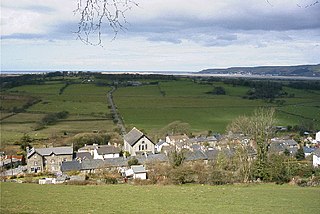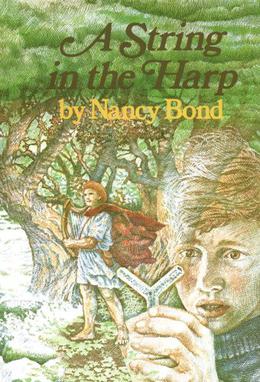
Gwydion fab Dôn is a magician, hero and trickster of Welsh mythology, appearing most prominently in the Fourth Branch of the Mabinogi, which focuses largely on his relationship with his young nephew, Lleu Llaw Gyffes. He also appears prominently in the Welsh Triads, the Book of Taliesin and the Stanzas of the Graves.
Ceridwen or Cerridwen was an enchantress in Welsh medieval legend. She was the mother of a hideous son, Afagddu, and a beautiful daughter, Creirwy. Her husband was Tegid Foel and they lived near Bala Lake in north Wales. Medieval Welsh poetry refers to her as possessing the cauldron of poetic inspiration (Awen) and the Tale of Taliesin recounts her swallowing her servant Gwion Bach who is then reborn through her as the poet Taliesin. Ceridwen is regarded by many modern pagans as the Celtic goddess of rebirth, transformation, and inspiration.
Gwyddno Garanhir was the supposed ruler of a sunken land off the coast of Wales, known as Cantre'r Gwaelod. He was the father of Elffin ap Gwyddno, the foster-father of the famous Welsh poet Taliesin in the legendary account given in the late medieval Chwedl Taliesin.
Maelgwn Gwynedd was king of Gwynedd during the early 6th century. Surviving records suggest he held a pre-eminent position among the Brythonic kings in Wales and their allies in the "Old North" along the Scottish coast. Maelgwn was a generous supporter of Christianity, funding the foundation of churches throughout Wales and even far beyond the bounds of his own kingdom. Nonetheless, his principal legacy today is the scathing account of his behavior recorded in De Excidio et Conquestu Britanniae by Gildas, who considered Maelgwn a usurper and reprobate. The son of Cadwallon Lawhir and great-grandson of Cunedda, Maelgwn was buried on Ynys Seiriol, off the eastern tip of Anglesey, having died of the "yellow plague"; quite probably the arrival of Justinian's Plague in Britain.
Taliesin was an early Brittonic poet of Sub-Roman Britain whose work has possibly survived in a Middle Welsh manuscript, the Book of Taliesin. Taliesin was a renowned bard who is believed to have sung at the courts of at least three kings.

Welsh mythology consists of both folk traditions developed in Wales, and traditions developed by the Celtic Britons elsewhere before the end of the first millennium. As in most of the predominantly oral societies Celtic mythology and history were recorded orally by specialists such as druids. This oral record has been lost or altered as a result of outside contact and invasion over the years. Much of this altered mythology and history is preserved in medieval Welsh manuscripts, which include the Red Book of Hergest, the White Book of Rhydderch, the Book of Aneirin and the Book of Taliesin. Other works connected to Welsh mythology include the ninth-century Latin historical compilation Historia Brittonum and Geoffrey of Monmouth's twelfth-century Latin chronicle Historia Regum Britanniae, as well as later folklore, such as the materials collected in The Welsh Fairy Book by William Jenkyn Thomas (1908).
Rhun ap Maelgwn Gwynedd, also known as Rhun Hir ap Maelgwn Gwynedd, sometimes spelt as 'Rhûn', was King of Gwynedd. He came to the throne on the death of his father, King Maelgwn Gwynedd. There are no historical records of his reign in this early age. A story preserved in both the Venedotian Code and an elegy by Taliesin says that he waged a war against Rhydderch Hael of Alt Clut and the kings of Gododdin or Manaw Gododdin. The small scattered settlement of Caerhun in the Conwy valley is said to be named for him, though without strong authority. Rhun also appears in several medieval literary stories, as well as in the Welsh Triads. His wife was Perwyr ferch Rhûn "Ryfeddfawr" and their son was Beli ap Rhun "Hîr".
Tablet of Destinies is a fantasy novel by Traci Harding. It is the second installment of a trilogy known as The Celestial Triad. The story follows a 20th-century Australian woman who is transported to 5th century Wales in an attempt to change the future. Major themes within the book include time travel, martial arts, magic and psychic phenomenon.
Hywel ab Owain Gwynedd, Prince of Gwynedd in 1170, was a Welsh poet and military leader. Hywel was the son of Owain Gwynedd, prince of Gwynedd, and an Irishwoman named Pyfog. In recognition of this, he was also known as Hywel ap Gwyddeles. Hywel is also known as the Poet Prince for his bardic skills.
The Battle of Arfderydd was fought in medieval Britain in AD 573, according to the Annales Cambriae. The opposing armies are identified in a number of Old Welsh sources but vary between them, perhaps suggesting several allied armies were involved. The main adversaries appear to have been Gwenddoleu ap Ceidio and either the princely brothers Peredur and Gwrgi or King Riderch Hael of Strathclyde. Gwenddoleu was defeated and killed in the battle. His bard, Myrddin Wyllt, reportedly went mad and ran into the forest. He is one of several proposed origins for the Arthurian character Merlin. The Welsh Triads refer to this battle as one of the "Three Futile Battles of the Island of Britain", along with the Battle of Camlann and the Battle of the Trees.

Rhydderch Hael, Riderch I of Alt Clut, or Rhydderch of Strathclyde, was a ruler of Alt Clut, a Brittonic kingdom in the Hen Ogledd or "Old North" of Britain. He was one of the most famous kings in the Hen Ogledd, and appears frequently in later medieval works in Welsh and Latin.
According to Welsh tradition, the event sometimes referred to in English as the Contention of the Bards took place at Deganwy in the Kingdom of Gwynedd, and was a contest in bardic skill between Taliesin and the court poets of king Maelgwn Gwynedd, led by Heinin. According to the legendary history of Taliesin, the poet was a boy of 12 at the time, and was the bard of Elffin ap Gwyddno. Maelgwn is said to have held Elffin in captivity and Taliesin challenged his bards to a bardic contest for which Elffin was the prize. Taliesin won the contest and Elffin's freedom, and also (correctly) prophesied Maelgwn's death from a swamp-born pestilence.
The Ancient Future Trilogy is a set of fantasy novels by Traci Harding. The story follows a 20th-century Australian woman who is transported to 6th century Wales in an attempt to change the future. Major themes within the series include time travel, martial arts, magic and Psychic Phenomena. The three novels in the series are The Ancient Future: The Dark Ages, An Echo In Time: Atlantis and Masters of Reality: The Gathering.
The Celestial Triad is a set of fantasy novels by Traci Harding. The story follows a 20th-century Australian woman who is transported to 5th century Wales in an attempt to change the future. Major themes within the series include time travel, martial arts, magic and psychic phenomenon. It is the second trilogy to feature the characters concerned, the first being The Ancient Future Trilogy.

The Misfortunes of Elphin (1829) is a short historical romance by Thomas Love Peacock, set in 6th century Wales, which recounts the adventures of the bard Taliesin, the princes Elphin ap Gwythno and Seithenyn ap Seithyn, and King Arthur. Peacock researched his story from early Welsh materials, many of them untranslated at the time; he included many loose translations from bardic poetry, as well as original poems such as "The War-Song of Dinas Vawr". He also worked into it much satire of the Tory attitudes of his own time. Elphin has been highly praised for its sustained comic irony, and by some critics is considered the finest Arthurian literary work of the Romantic period.

Tre-Taliesin is a village in Ceredigion on the A487 road, 9 miles north of Aberystwyth, Wales, and 9 miles south of Machynlleth. It is in the parish of Llangynfelyn.
According to Welsh tradition, Afaon fab Taliesin was the son of the bard Taliesin and a member of King Arthur's retinue. He appears both in the Welsh Triads and in the medieval Arthurian tale Breuddwyd Rhonabwy.

A String in the Harp is a children's fantasy novel by Nancy Bond first published in 1976. It received a 1977 Newbery Honor award and the Welsh Tir na n-Og Award. It tells of the American Morgan family who temporarily move to Wales, where Peter Morgan finds a magical harp key that gives him vivid visions of the past. This well-received novel is an unusual time travel story, with its focus on the emotional pain and separation the Morgans experience after the death of their mother and the gradual healing they find through their experiences.

The Hanes Taliesin is a legendary account of the life of the poet Taliesin recorded in the mid-16th century by Elis Gruffydd. The tale was also recorded in a slightly different version by John Jones of Gellilyfdy. This story agrees in many respects with fragmentary accounts in The Book of Taliesin and resembles the story of the boyhood of the Irish hero Fionn mac Cumhail and the salmon of wisdom in some respects. It was included in Lady Charlotte Guest's Mabinogion.
Rhun is a Welsh Masculine given name meaning "Great, Mighty". Variants of the name are; Rhûn, Rhyn and Rhŷn.






